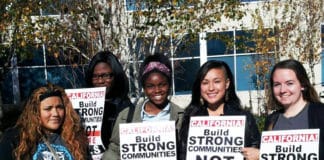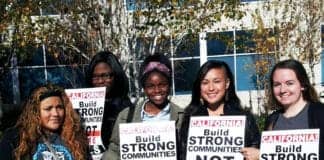Tags Project What!
Tag: Project What!
Wanda’s Picks for November 2015
“Twenty Years of Speaking Truth to Power” is the theme for CCWP’s 20th anniversary gala, on Saturday, Nov. 7, 7 p.m., at the Women’s Building 3543 18th St., San Francisco. For information, call 415-255-7036, ext. 4, and if you’d like to volunteer at the event, visit womenprisoners.org. Featured guests include Patrisse Cullors, co-founder of Black Lives Matter; Jayda Rasberry, organizer with Dignity and Power Now; Thao Nguyen, Thao & The Get Down Stay Down; and the Heiwa Taiko Drummers.
Children of incarcerated parents say no to a new jail in...
San Francisco’s jail population is steadily decreasing, and we hope that the number of San Francisco youth struggling to find support during their parents’ and family members’ incarceration will decrease with it. This is why we as youth who have all experienced parental incarceration in San Francisco oppose a new jail in our city. Why invest in a new jail rather than the potential of our youth?
The story behind the 2015 California Budget Act
In mid-June, Gov. Brown signed the Budget Act of 2015, which shows no vision for the future of most Californians. In total, this budget underestimated the amount of resources available, overestimated the cost of vital programs, and chose spending on debt service, rainy day funds and prisons instead of the people of California and the vital services they need.
Chowchilla Freedom Rally: It just ain’t right
Young women at the Chowchilla Freedom Rally Jan. 26 spoke out passionately for their sisters in a prison packed to nearly double its capacity, demanding that the 4,500 prisoners eligible for release be freed. At least 400 people came from all over California to show their support for the women locked up in the Central California Women’s Facility, currently the state’s only women’s prison.
CDCR to release 4,000 primary caregivers from women’s prisons
The California Department of Corrections and Rehabilitation (CDCR) announced Tuesday that non-serious, non-violent, non-sex offenders who are female, pregnant or were primary caregivers prior to incarceration and have less than two years of their sentences left are eligible to serve the rest of their sentences in residential homes, residential substance-abuse treatment programs or transitional care facilities.

 Store
Store







